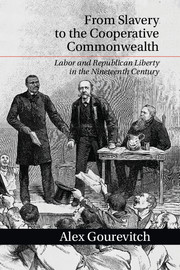Book contents
3 - “The Sword of Want”
Free Labor against Wage Labor
Published online by Cambridge University Press: 05 December 2014
Summary
a very numerous race of poor men;
of unfortunate human beings;
without resources of property; and, therefore, dependent,
even for their very existence, upon the pleasure,
the caprice, the tyranny, or the folly of others
Thomas Skidmore
On August 14, 1828, a group of workers crowded into the first floor of Commissioner’s Hall, a sturdy, two story brick building in the Southwark district of Philadelphia, to listen to a speech called, “Principles of Aristocratic Legislation.” The speaker, William Heighton, was a radical cordwainer, founder of the Working Men’s Party of Philadelphia, and editor of the party’s journal, the Mechanics’ Free Press, the first labor press ever published in the United States. In his speech, Heighton criticized the United States for living up to its revolutionary promise in political form but not economic practice:
we all acknowledge that the foundation of our independence was laid in the establishment, by our forefathers, of this inestimable right [of universal suffrage], and that in it we possess the means of ... attaining that happy state of real liberty and universal independence ... yet who will tell us, that the superstructure itself is yet, more than an ideal one? Who that is acquainted with the actual condition of society, that has visited the Plantation, the Quarry, the Workshop, the Forge and the Factory ... who, I say, that has seen these things will yet tell us, that the sacred sounds of liberty and equality have any actual existence among us?
Heighton was not alone in worrying that it was not just the slave “Plantation” but “the Workshop, the Forge and the Factory” that threatened universal independence. Heighton’s Working Men’s Party of Philadelphia, founded in 1827, was the first of many to crop up in the rapidly industrializing towns and cities of the late 1820s. These organizations shared a common vocabulary and were driven by a sense that the American Revolution was unfinished. As Seth Luther, an important New England labor advocate of the time, put it in an 1833 speech, “as we have adverted to Bunker Hill, we remark, in passing, that the unfinished monument is a most excellent emblem of our unfinished independence.” Although free from external subjection to colonial overlords, internal forms of servitude remained even in the nominally “free” North.
- Type
- Chapter
- Information
- From Slavery to the Cooperative CommonwealthLabor and Republican Liberty in the Nineteenth Century, pp. 67 - 96Publisher: Cambridge University PressPrint publication year: 2014

